
How Niche Websites Should Approach Authority Topics
Get helpful updates in your inbox
How Niche Websites Should Approach Authority Topics
The Google Medic Update of 2018 was a Google Core Algorithm update that negatively impacted publishers in the YMYL (Your Money, Your Life) space. Since then, many publishers have wondered how they should approach authority topics, and some have even strayed from building websites in YMYL niches altogether.
Not only that, but a lot of publishers often have questions about starting websites in specific niches because they are worried they may not be able to rank, make money, gain authority, or even know what niche to start building in.
Today, I’m going to be talking about how niche websites should approach authority topics. You can watch the full Ezoic Explains on this topic below.
Is it worth it to start a website in a YMYL niche?
The short answer is yes.
If you can write more comprehensive and authoritative content than what is out there, there is no reason you should not write content on any given niche.
Additional reading: How to add authority to YMYL topics instantly
If you are an expert in a subject, you shouldn’t concern yourself with if you can rank or make money. As long as you can provide in-depth information that is better or different than is already out there, you should be fine.
Additionally, if you’re not an expert, you can heavily research topics and write in-depth and comprehensive information. This would also allow you to link to credible sources, which will give you a better chance of ranking.
Pro tip: You can also leverage forums like Reddit, Quora, and even Facebook groups that specialize in certain topics to find more expert sources outside of yourself. An example of this would be if you’re writing an article on how to retire before 35 years old, you can find info on this from people who have strategies to accomplish this goal in forums, groups, etc. to help better answer the questions you intend to answer in your article.
How to improve your content in your authoritative niches
Before you write an article, especially ones in authoritative niches or topics, you should first go to Google. If you want to be on the first page of Google, you need to see what is already ranking there. Even if you use keyword research tools, you should still go to Google first.
Here are some strategies to improve your content in authoritative niches.
Look up keywords in your niche and see what content is already ranking
For example, let’s say I’m an expert on bikes and I want to write on ‘the best bike for commuting.’
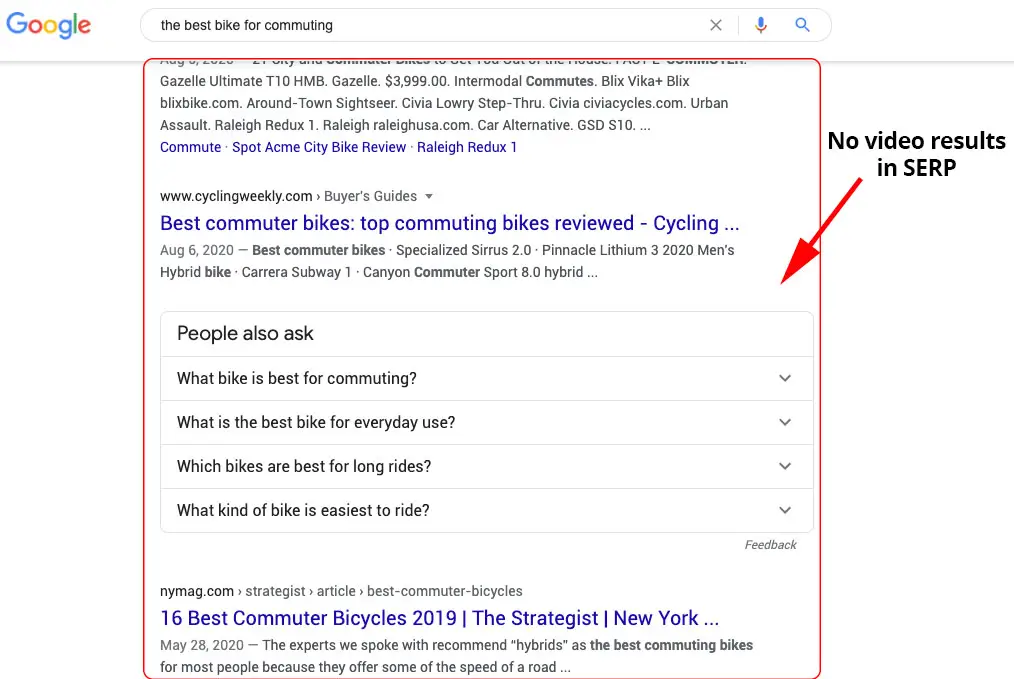
I can see that there are multiple articles on this, but no video results. This could be a good opportunity to create a really comprehensive video on commuting bikes that could potentially rank at the top.
As for the articles, I would want to read through the content and see what gaps I could fill in that aren’t being discussed in the article titles or the articles themselves. Ask yourself these things:
- Is there a lack of videos or pictures?
- Could there be an infographic?
- How is the linking structure (too few links)?
- If all the top articles are numbered lists, perhaps you can make an ‘ultimate guide’, or vice-versa.
- What is the domain authority of the websites on the first page of Google? (Lower domain authority = easier to outrank)
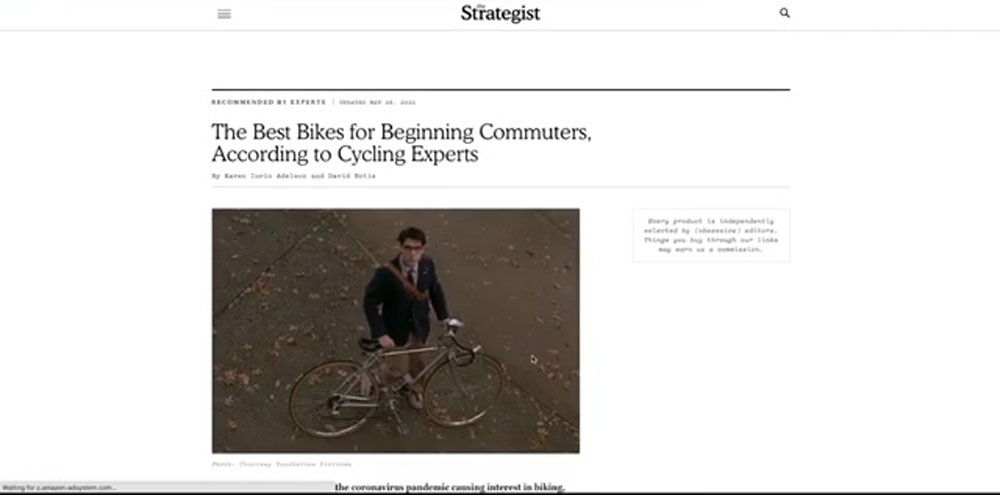
This particular article doesn’t go into excessive detail about each bike, but instead, it just gives an overview. Publishers should look critically at competitors’ content and determine what about the content you can improve or do better.
Understand how Google interprets your content
You can also take your content and see how Google understands what your content is about.
This is made possible by using Google’s Cloud Natural Language tool. Copy the content from one of the ranking websites and paste it into the Natural Language API demo. This allows you to analyze the text and see what entities are listed in the content.
For example: Let’s take the output from an article on the ketogenic diet. Below are the four different types of information the Natural Language Cloud will spit out. Entities, Sentiment, Syntax, and Categories.
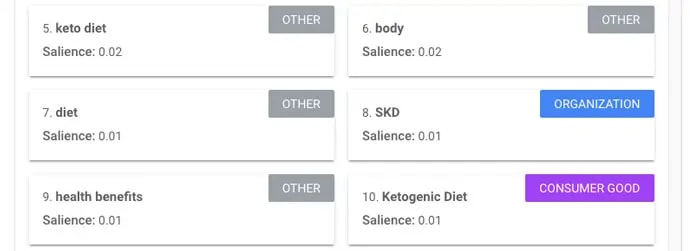
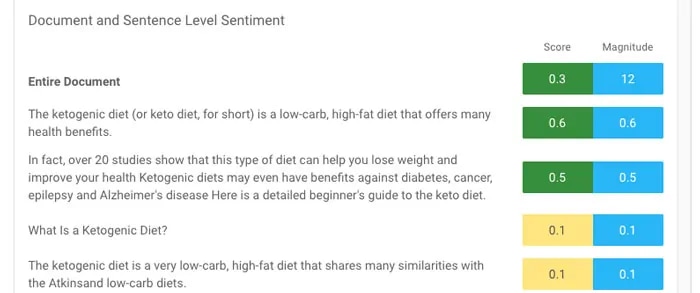
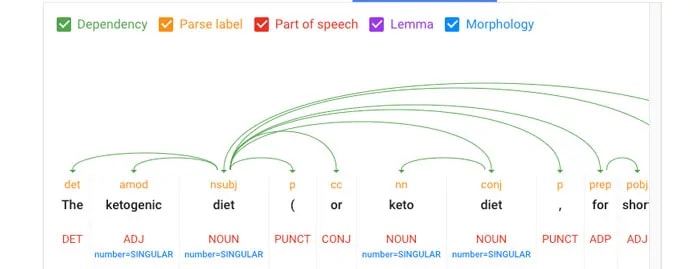

Enter your own content in and see if Google believes your content is about what you think it is about. You would want to make sure that your content covers similar entities to the other content currently ranking and consider what areas they aren’t so that your content can fill in those gaps.
A health-related example is if we research intermittent fasting. We can see there are a few high-ranking articles from Healthline and Harvard, but once again there are no video results. If we go over to video, we see some results from some lower-authority sites. A well-done video on intermittent fasting could have the potential to rank on that first page.
Health and fitness and YMYL topics are harder to rank for, but it’s not impossible. If you have done a lot of research and include citations and get links, there is no reason you shouldn’t start a YMYL or a website in whatever niche you’re interested in.
How to find niches that pay well
Beyond if you should even start a website in a specific niche, you might also be wondering how you can find a niche that pays well. The answer to this is there is no right or wrong answer. How much money a particular website earns all depends on the value of its audience to advertisers.
For example, you may have a gardening site that makes $15 RPM. There may be another gardening site that is making $5 RPM. Additionally, EPMV is a far better metric for measuring overall site revenue than RPM.
In the end, it’s impossible to predict if a certain niche is going to pay more or less because it all depends on your content and your audience. No specific niche is guaranteed to make a certain amount of money because everyone’s content and audiences are different.
That being said, there are certain categories of websites that are more valuable to advertisers than others. We wrote an article on the top-earning website categories in 2020. The data showed that the highest-earning website category was Home & Garden.
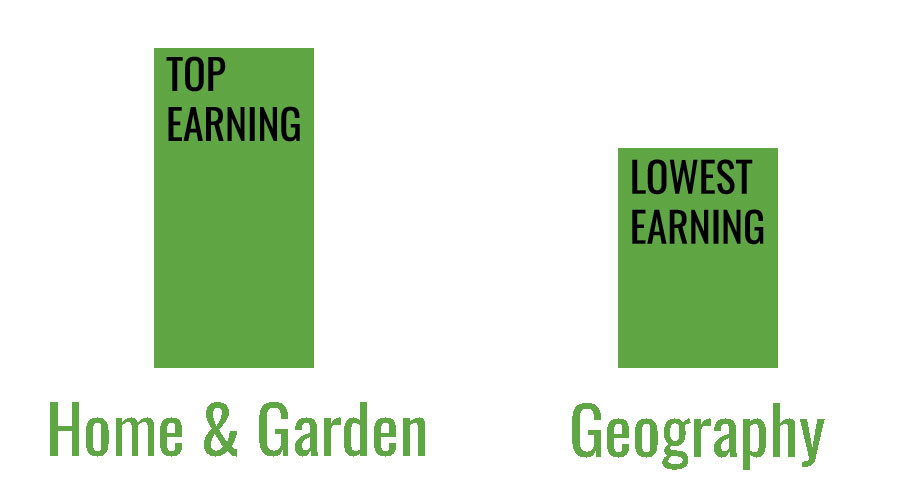
But why is this? Think about it:
EX: You own a home and garden site with a large following. Of the available ad inventory on your site, Home Depot wins the bid for the most valuable ad spot. That spot is going to be far more valuable to Home Depot than a spot on news website. Plus, the types of things those advertisers are typically advertising are of higher value as well. A visitor that clicks on and purchases a new John Deere riding mower from an ad on a home and garden site is more valuable than a visitor purchasing Glossier lip gloss from an ad on a news website.
How Data can improve SEO
Looking at search queries, we can see how this may be true; different queries are making varying amounts of money.
Looking at Ezoic’s Big Data Analytics, we can see that for this site, its average EPMV is $15.00. But many of its top search queries have to do with patents, and those make much higher than that average.
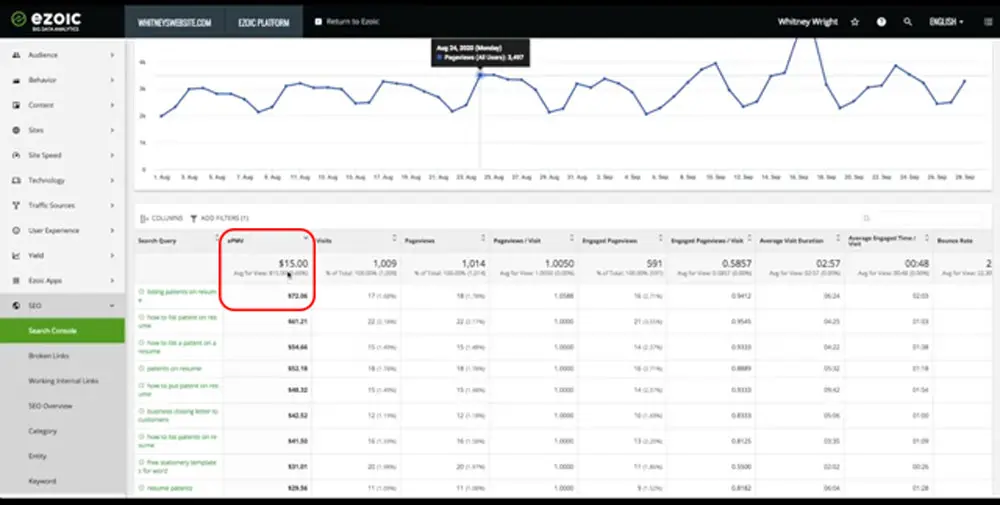
And this is true for all sites—there are certain queries that a different site in a similar niche may be ranking well for that this site is not.
This is why generally speaking, it’s unreliable to believe that a certain niche is going to make more money or not, or to compare your overall revenue to a similar site in your niche. Publishers shouldn’t focus on specific categories to write on, but instead focus on the queries within those categories.
Additionally, publishers using Ezoic’s Big Data Analytics also have the ability to see which content categories both earn the most revenue and have the highest level of user engagement.
For example: Look at the content categories data below from a publisher in the fishing niche.

You can see that “Bass Fishing” accounts for 44.49% of the total site revenue, and also accounts for the highest percentage of articles created as well (17.15%).
But, if you look at the EPMV by article category you see that “Fly Fishing” has the highest EPMV by far out of all the categories. What’s more is that the “Average Page Engaged Time” is 1 minute and 11 seconds, a good 20 seconds longer than the majority of the other categories.
What we know for certain from this data is that:
- Visitors are spending on average 20 seconds longer on Fly Fishing articles than any other category
- The earnings per thousand visitors are at least 85 cents higher than any other article category.
The knowledge this data brings is the type of information that will help publishers scale their website’s growth over time.
Wrapping it all up
Ultimately, publishers should stop focusing on if a niche makes a certain RPM or which niche will make you the most money. Your focus should be centered around: can I create expert content or not?
Do research on the niche you want to write in, whether that be YMYL (and other authority topics) or not, and see where you could fill in the gaps, or write more comprehensive information.
Consider how you can differentiate yourself from what else is out there and if your content is thorough and has authoritative links, you’re likely to succeed.
Do you have any questions on how to approach authority topics as a niche website? Let me know in the comments.
Featured Content
Checkout this popular and trending content

Ranking In Universal Search Results: Video Is The Secret
See how Flickify can become the ultimate SEO hack for sites missing out on rankings because of a lack of video.
Announcement

Ezoic Edge: The Fastest Way To Load Pages. Period.
Ezoic announces an industry-first edge content delivery network for websites and creators; bringing the fastest pages on the web to Ezoic publishers.
Launch

Ezoic Unveils New Enterprise Program: Empowering Creators to Scale and Succeed
Ezoic recently announced a higher level designed for publishers that have reached that ultimate stage of growth. See what it means for Ezoic users.
Announcement
